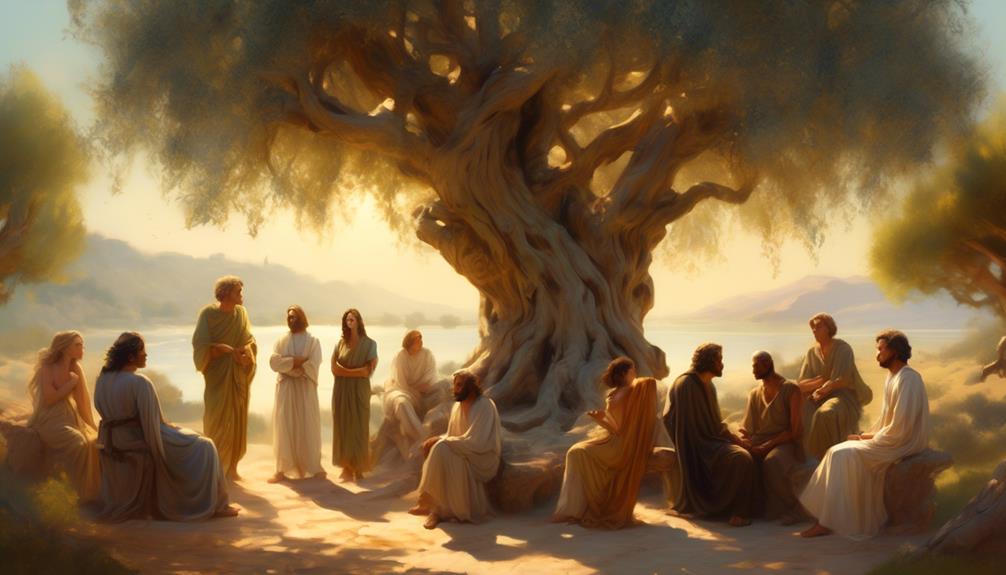In the vast tapestry of human existence, love has always been a subject of intrigue and contemplation. From the ancient wisdom of Plato to the modern insights of Simone De Beauvoir, the philosophy of love has captured the hearts and minds of famous philosophers throughout history.
Imagine a world where love is not just an emotion but a profound intellectual pursuit, where philosophers unravel the complexities and mysteries of this fundamental human experience.
'The Wisdom of Love: Insights From Famous Philosophers' invites you to embark on a journey through the depths of philosophical thought, where profound truths and timeless wisdom await those who dare to explore.
Key Takeaways
- Love is the driving force behind all human actions and encourages seeking wisdom and understanding, according to Plato.
- Aristotle believes that love is the ultimate pursuit of happiness, requiring a balance of emotions and virtues cultivated through virtuous friendships and self-love.
- Love serves as a gateway to fulfillment and purpose, allowing individuals to self-actualize and reach their potential for happiness, as seen in the concept of eudaimonia.
- Love empowers and transforms human existence, providing strength, resilience, and personal growth, according to Nietzsche.
Plato's Philosophical Perspective

Plato, the renowned philosopher, intricately weaves his profound philosophical perspective into the fabric of human existence. His philosophy delves deep into the realms of wisdom and love, offering profound insights that resonate with the deepest parts of our being.
Plato believed that love is the driving force behind all human actions, a force that propels us towards higher forms of knowledge and understanding. For him, love wasn't merely a fleeting emotion, but a powerful force that connected us to the divine and brought us closer to the truth.
Through his philosophical musings, Plato encourages us to seek wisdom through love, to embrace the beauty of the world and to strive for a deeper understanding of ourselves and the universe. His words beckon us to embark on a journey of self-discovery, to unlock the mysteries of our own existence and to find meaning in the pursuit of love and wisdom.
Aristotle's View on Love
In contemplating Aristotle's view on love, one is confronted with the notion that love is the ultimate pursuit of happiness.
For Aristotle, love isn't merely a fleeting emotion or desire, but rather a virtue that requires a delicate balance of emotions.
It's through the cultivation of virtuous friendships and the development of self-love that individuals can truly find fulfillment and achieve a harmonious state of being.
Aristotle's Perspective
Love, according to Aristotle, is a virtuous pursuit that can be cultivated and nurtured through the practice of kindness, generosity, and patience. In his ancient philosophy, Aristotle believed that love goes beyond mere emotions and desires. It's a concept that requires the development of virtuous qualities to truly flourish.
Aristotle distinguished between different types of love, such as philia, which is the love between friends based on mutual respect and shared virtues, and eros, the passionate and romantic love that ignites desire and longing.
For Aristotle, love isn't a passive feeling, but an active choice to embody virtues and strive for the ultimate goal of eudaimonia, or human flourishing. Through the practice of love, one can experience deep connection, fulfillment, and a sense of belonging within the harmonious fabric of society.
Love as Ultimate Happiness
Love, the ultimate pursuit of human happiness, according to Aristotle, intertwines with the very essence of our existence, offering a boundless path towards eudaimonia.
- Love is the gateway to true fulfillment and purpose, guiding us towards the realization of our potential.
- Grounded in virtue, love fosters a connection that transcends the superficial, allowing for a deep and meaningful bond.
- Through love, individuals can self-actualize, reaching their highest potential for happiness.
- Aristotle sees love as an essential component of eudaimonia, encompassing flourishing and genuine well-being.
In this quest for ultimate happiness, love serves as the compass, guiding us towards the wisdom of a life well-lived. It's through the pursuit of love that we uncover the depths of our souls and find solace in the embrace of another.
Love, as Aristotle suggests, isn't merely an emotion but a transformative force that propels us towards a state of true happiness. In the wisdom of love, we discover the secrets of our existence, and in its embrace, we find the fulfillment we seek.
Nietzsche's Contemplation of Love

Enveloped in the ethereal embrace of passion's fire, Nietzsche's contemplation transcends the boundaries of mortal existence, unfurling the essence of love's transformative power.
Nietzsche's exploration of love delves deep into the realm of human experience, challenging conventional notions and urging individuals to view love as a force that empowers and elevates human existence.
Finkielkraut writes, Levinas thought, Nietzsche believed that love isn't merely an emotion, but a driving force that compels individuals to strive for greatness.
It's through love, Nietzsche suggests, that one can transcend their current state and reach for higher ideals. Love, in Nietzsche's eyes, isn't a weakness, but a source of strength, resilience, and personal growth.
It's the foundation upon which authentic connections and meaningful relationships are built. Nietzsche's contemplation on love invites us to embrace its transformative power and find within ourselves the capacity to love others and the world.
Simone De Beauvoir's Feminist Insights
As Nietzsche's contemplation on love reaches its zenith, the ethereal flames of passion give way to Simone De Beauvoir's feminist insights, igniting a revolution that challenges the very foundations of traditional gender roles and societal expectations.
With her powerful voice, De Beauvoir emphasized the importance of women's autonomy and independence. She rebelled against the notion that women should be confined to predetermined roles, urging them to define themselves outside of male-defined concepts.
De Beauvoir highlighted the significance of women's lived experiences and the oppression they faced, shedding light on the inequalities that exist within society. Her feminist insights laid the foundation for the modern feminist movement, inspiring countless individuals to question and dismantle the systems that limit human potential.
Through her words, De Beauvoir reminds us that love makes us see the humanity in one another, and it's through this understanding that true equality can be achieved.
Levinas' Ethical Understanding of Love

Levinas' Ethical Understanding of Love unveils the elusive essence of human connection, revealing its transformative power and ethical imperative.
Unlike traditional philosophical approaches that prioritize the love of wisdom (philosophy) or ontology, Levinas emphasizes the ethical dimension of love.
For him, love isn't just a mere intellectual pursuit, but a profound responsibility towards the Other.
Through love, Levinas argues, we make the Other visible, acknowledging their humanity and prioritizing their needs and well-being above our own.
Drawing inspiration from biblical passages, Levinas' concept of love transcends traditional notions of self-interest and self-fulfillment.
It's a love that requires us to constantly engage in ethical decision-making, placing the needs and dignity of others at the forefront.
In this way, love becomes not only a transformative force within ourselves, but also a catalyst for creating a more just and compassionate world.
Modern Philosophers' Perspectives on Love
Love's essence, explored through the lens of modern philosophers, reveals profound insights into the transformative power of human connection and the intertwining of truth and justice. As one delves into the philosophy of love, as presented by modern thinkers, a deeper understanding emerges, shedding light on the complexities and nuances of this powerful emotion.
Here are some key perspectives that help us navigate the intricate terrain of love:
- Love as a moral imperative: Modern philosophers emphasize the ethical dimensions of love, emphasizing its role in fostering compassion and empathy towards others.
- Love as a catalyst for personal growth: Love has the potential to inspire self-reflection and personal transformation, allowing individuals to confront their vulnerabilities and embrace their authentic selves.
- Love as a bridge between truth and justice: In the realm of love, truth and justice converge, as the pursuit of both requires a commitment to honesty, fairness, and mutual respect.
- Love as a force for societal change: Modern philosophers recognize the collective power of love, advocating for its role in dismantling systems of oppression and fostering social justice.
In the exploration of love's depths, modern philosophers offer us a profound understanding of its significance in our lives, inviting us to embrace its transformative potential.
Conclusion
In the realm of love, philosophers uncover the hidden depths and intricate nuances that make this human experience so captivating. Like a tapestry woven with countless threads, love intertwines with our existence, shaping our perceptions and guiding our actions.
Through the wisdom of famous philosophers, we're invited to explore the kaleidoscope of perspectives on love, gaining a richer understanding of its profound influence on our lives.
Let's embrace this wisdom, like a compass pointing us towards the boundless horizon of love's mysteries.
